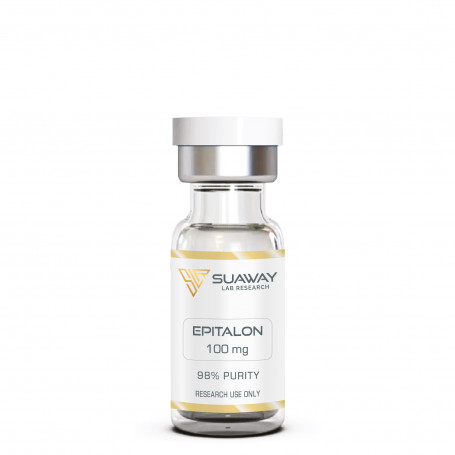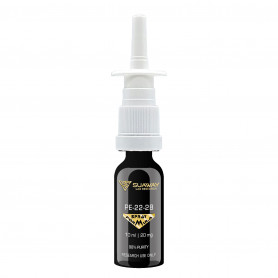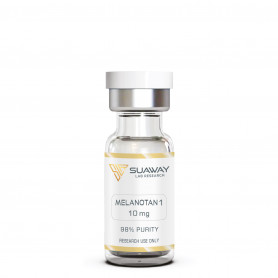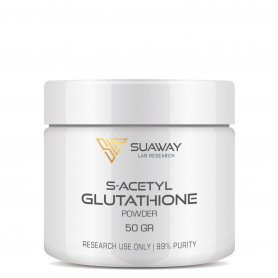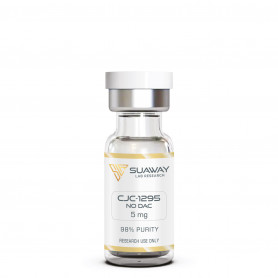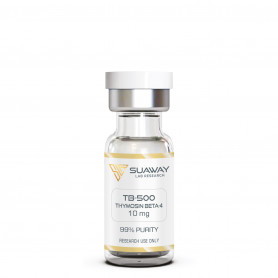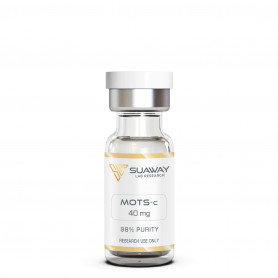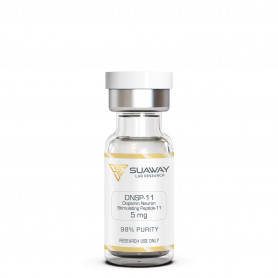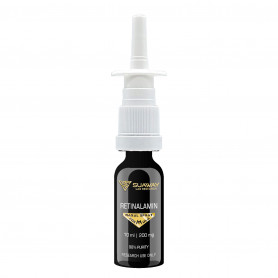EPITALON - 100 mg
Epitalon stimola il rinnovamento di tutto il corpo, iniziando dagli organi interni e procedendo verso l'esterno fino alla pelle. Dimostra una varietà di bioattività, tra cui le seguenti:
- Miglioramento della condizione della retina oculare nella retinite pigmentosa
- Anti-invecchiamento attivando la cromatina nella vecchiaia
- Effetti metastatici antitumorali e antitumorali
- Attivazione telomerasi
- Allungamento dei telomeri
- Sopravvivenza delle cellule, resistenza allo stress e cambiamenti ossidativi
- Bilanciamento della secrezione endocrina, miglioramento della funzione della ghiandola pineale e aumento del rilascio di melatonina
- Diminuzione dei livelli di cortisolo
- Aumento degli enzimi antiossidanti
- Aumento della salute del cervello
Description
STRUTTURA
Sequenza: Ala-Glu-Asp-Gly
Formula molecolare: C 14 H 22 N 4 O 9
Peso molecolare: 390,349 g/mol
Numero CAS: 307297-39-8
Purezza del peptide: superiore al 98%
Altri dettagli: Nessun sale TFA
Stoccaggio: Il peptide liofilizzato deve essere conservato a -20°C e la soluzione di peptide a 4°C.
Epitalon ha una bassa biodisponibilità orale ed eccellente sottocutanea.
DESCRIZIONE
Epitalon is a short synthetic peptide that has been shown to promote melatonin production and activate the enzyme telomerase. Epitalon was first created in Russia in the 1980s and has since been found to prolong the life span of rodents by delaying age-related changes in the reproductive and immune systems and increasing overall body weight. Epitalon has been proven to have substantial effects in some forms of cancer, infectious illness, and DNA control. However, it is largely of interest in the study of anti-aging.
Experiments conducted in vitro on human somatic cells have shown compelling evidence that epitalon is capable of stimulating the activity of an enzyme known as telomerase . The enzyme telomerase safeguards telomeres, which are located at the very tips of chromosomes and essential to maintaining DNA integrity. The telomerase activation by epitalon directly results in a reduction in the number of mistakes present in a strand of DNA, lending credence to the idea that epitalon shields DNA from being damaged. In a nutshell, epitalon guards DNA against the gradual accumulation of mistakes over time, which is a process that ultimately results in dysfunctional cells, aging, and in some instances, even cancer.
It does not seem that the effects that epitalon has on telomeres or free radicals are adequate to explain the dramatic impacts that epitalon has on a person's lifespan. Researchers are putting in a lot of effort to comprehend how this short peptide can accomplish its results so that the pathways may be investigated in more detail. It seems that the fact that epitalon alters the expression of specific genes might provide at least a portion of the solution.
Various types of research point to the possibility that epitalon may affect the capacity of the immune system and the body to mend itself not only in the aftermath of physical trauma but also in the aftermath of the ordinary stresses of daily life.
It should not come as a surprise that epitalon affects the immune system. According to studies conducted on rats, epitalon causes an increase in interferon-gamma production in lymphocytes that have aged. One of the most important signaling molecules in the immune system is interferon-gamma. The activation of macrophages, natural killer cells, and T cells play a key role in the defense against viral infections.
The following is a list of known interactions between epitalon and DNA:
- Telomerase – The activity of the telomerase gene extends the life of cells
- CD5 – This leads to immune cell differentiation
- IL-2 – Activates the production of IL-2, which controls the activity of white blood cells
- MMP2 – Increases MMP activity while also reducing inflammation
- Tram1 – Increases the synthesis of proteins
- Arylalkylamine-N-acetyltransferase – Increases the synthesis of melatonin
- pCREB t – The modulation of the circadian rhythm and its anti-neoplastic effects
As mentioned before, epitalon has a favorable influence on the gene responsible for MMP2 regulation. Connective tissues, such as the skin, contain a protein known as MMP2. According to the findings of studies conducted on rodents, epitalon is capable of activating not only this gene but also fibroblasts. Fibroblasts are the cells responsible for the production and maintenance of MMP2 and other parts of the extracellular matrix, such as collagen and elastin.
The fact that epitalon reduces caspase-3 activity proves that it benefits the skin. Caspase-3 is an enzyme that plays a role in the process of apoptosis, often known as programmed cell death. Epitalon helps protect fibroblasts or other skin cells by lowering the activity of caspase-3, which in turn helps to keep these cells alive and in good health for longer periods.
It was discovered that administering epitalon daily to rats with cancer resulted in a reduction in the development of tumors. The peptide inhibits the development of tumors and stops the metastasis, or spread, of malignancies to other tissues in the body. It is interesting to prevent the development of some forms of leukemia and testicular cancer. Currently, epitalon is being explored as a possible therapy for Her-2/neu positive breast malignancies.
There is some evidence to suggest that epitalon is responsible for activating the gene that encodes the PER1 protein in the hypothalamus. Cancer patients often have lower levels of the gene PER1, which regulates circadian rhythm. It is not apparent if this under-expression occurs before the formation of cancer and hence plays a role in the progression of cancer or whether it is a result of the development of cancer. After cancer has already taken root, it is obvious that the protein affects the disease's progression. The regulation of PER1 expression might be one of the natural ways to decrease the progression of tumors.
The pineal gland is responsible for producing the hormone melatonin, which has been connected to sleep and the aging process. Epitalon and other similar peptides have been shown to affect the synthesis of melatonin and its release, according to research conducted on rats. This is accomplished by influencing the expression of two proteins, arylalkylamine-N-acetyltransferase (AANAT) & pCREB transcription protein. Both of these genes play a significant part in synthesizing melatonin and the circadian (day/night) regulation of melatonin release. The circadian rhythm controls melatonin production. According to studies conducted on monkeys, epitalon may bring melatonin production back to normal.
Epithalon was shown to enhance outcomes in an experiment involving rats with retinitis pigmentosa, with 90% of patients benefiting from the treatment. It would seem that the peptide assists in maintaining the normal structure of the eye while simultaneously enhancing the bioelectric function of the retina, which is important for vision.
REFERENCES
V. Khavinson et al., "Pineal-regulating tetrapeptide epitalon improves eye retina condition in retinitis pigmentosa" [PubMed]
I.A. Vinogradova et al., "Effect of Ala-Glu-Asp-Gly peptide on life span and development of spontaneous tumors in female rats exposed to different illumination regimes" [PubMed]
T.A. Dzhokhadze et al., "[Functional regulation of genome with peptide bioregulators by hypertrophic cardiomyopathy (by patients and relatives)]" [PubMed]
I.N. Alimova et al., "Effect of Epitalon and Vilon treatment on mammary carcinogenesis in transgenic erbB-2/NEU mice" [PubMed]
N.S. Lin'Kova et al., "Peptide Ala-Glu-Asp-Gly and interferon gamma: their role in immune response during aging" [PubMed]
D.A. Sibarov et al., "Epitalon influences pineal secretion in stress-exposed rats in the daytime" [PubMed]
N.S. Lin'Kova et al., "Peptide Regulation of Skin Fibroblast Functions during Their Aging In Vitro" [PubMed]
I.F. Labunets et al., "Effect of epithalamin on circadian relationship between the endocrine function of the thymus and melatonin-producing function of the pineal gland in elderly people" [PubMed]
D.A. Sibarov et al., "Effects of intranasal administration of epitalon on neuron activity in the rat neocortex" [PubMed]
V.N. Anisimov et al., "Epithalon decelerates aging and suppresses development of breast adenocarcinomas in transgenic her-2/neu mice" [PubMed]
G. Kossoy et al., "Effect of the synthetic pineal peptide epitalon on spontaneous carcinogenesis in female C3H/He mice" [PubMed]
N.I. Chasilova et al., "Short peptides stimulate skin cell regeneration during ageing" [PubMed]
O.V. Korkushko et al., "Effect of peptide preparation epithalamin on circadian rhythm of epiphyseal melatonin-producing function in elderly people" [PubMed]
V.K. Khavinson et al., "Effect of regulatory peptides on gene transcription" [PubMed]
V. Khavinson et al., "AEDG Peptide (Epitalon) Stimulates Gene Expression and Protein Synthesis during Neurogenesis: Possible Epigenetic Mechanism" [PubMed]
V.N. Anisimov et al., "Effect of Epitalon on biomarkers of aging, life span and spontaneous tumor incidence in female Swiss-derived SHR mice" [PubMed]
G. Kossoy et al., "Epitalon and colon carcinogenesis in rats: proliferative activity and apoptosis in colon tumors and mucosa" [PubMed]
V.N. Anisimov et al., "Inhibitory effect of the peptide epitalon on the development of spontaneous mammary tumors in HER-2/neu transgenic mice" [PubMed]
V.K. Khavinson et al., "Epithalon peptide induces telomerase activity and telomere elongation in human somatic cells" [PubMed]
V.N. Anisimov et al., "Pineal peptide preparation epithalamin increases the lifespan of fruit flies, mice and rats" [PubMed]
V.K, Khavinson et al., "Short cell-penetrating peptides: a model of interactions with gene promoter sites" [PubMed]
V. Khavinson et al., "Peptide Epitalon activates chromatin at the old age" [PubMed]
DISCLAIMER
Questo prodotto è destinato esclusivamente all'uso in ricerca e sviluppo di laboratorio. Questi studi vengono eseguiti al di fuori del corpo. Questo prodotto non è un medicinale o una droga e non è stato approvato dalla FDA o dall'EMA per prevenire, trattare o curare qualsiasi condizione medica, disturbo o malattia. L'introduzione corporea di qualsiasi tipo in esseri umani o animali è severamente vietata dalla legge. Questo prodotto deve essere maneggiato solo da professionisti autorizzati e qualificati.
Tutte le informazioni sui prodotti fornite su questo sito Web sono solo a scopo informativo ed educativo.

